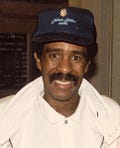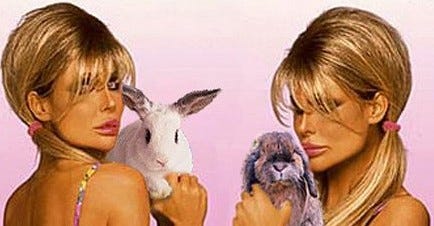Richard Pryor’s Legacy Lives on—Advocating on Behalf of Laboratory Animals
An Interview with Jennifer Lee Pryor
By Jordan Schaul | National Geographic | November 17, 2012
Contributing Editor Dr. Jordan Schaul and legendary celebrity animal activists, the Barbi Twins, interview Jennifer Lee Pryor, wife of the late Richard Pryor. We discuss Richard’s legacy as a crusader for the voiceless members of the animal kingdom.
Jennifer Lee Pryor was twice married to Richard Pryor, one of the most influential comedians of the 20th century. Richard was an entertainment icon. He was also a great friend to animals and tried to change the way we think about them.
Today, Jennifer carries on his legacy as an animal advocate and antivivisectionist. Before his death, Jennifer and the celebrity vegetarian, who often anthropomorphized animals in his sketches, were ardent opponents of using of primates in invasive biomedical research. Richard and Jennifer were supporters of the Primate Freedom Project and Jennifer continues to educate people about vivisection.
We interviewed Jennifer to find out more about Richard’s love for animals and Jennifer’s continuing effort to advocate on behalf of the animal kind.
Barbi Twins: We remember meeting you at a fundraiser at THE IMPROV in Hollywood where you were being honored for your rescue work; your husband, Richard, had recently passed, but you kept on rescuing animals. In fact, you doubled your efforts during that painful and difficult time. I recall thinking how terrific it was that you found a way to mourn your husband while honoring him. You saved so many dogs during that time of loss. Did that help you heal after such a sad time in your life?
Jennifer Pryor: Oh [heck] yeah. It was something positive I could do in Richard’s name. We founded Pryor’s Planet together and I know he was sitting on my shoulder spurring me on to work through the pain by saving lives.
Barbi Twins: I have always been impressed by the fact that you are so hands-on: you hold adoptions and foster dogs, all while actually doing much of the heavy lifting yourself. We run into so many people with their dogs that were adopted from “Jennifer Pryor,” living in all areas! And we’ve cried together on so many animal issues. Have you always been an animal lover, Jenny?
Jennifer Pryor: I remember trying to save a wounded squirrel as a child, that squirrel bit the [heck] out of me..(lol) but that didn’t stop me. I adored all animals. We lived next door to a farmer where I hung out with his Holstein cows and his three-legged dog, FLASH. My mother was a big animal lover and was always bringing home strays; we had a pet snake named Penelope and a goat who hung out in our house!
Barbi Twins: Did you influence Richard regarding his love of animals or was that a bond you shared?
Jennifer Pryor: Oh, Richard always loved animals. When I met him he had Ginger, a miniature pony that Burt Sugarman had given him; he also had a Great Dane. He also had had monkeys at one time, Girlfriend and Boyfriend. Richard mimicked animals in his comedy routines: a deer in the wood and he gave a voice to a neighbor’s German Shepherd who took pity on Richard during a heartbreak. Richard had a deep well of empathy and compassion. It was a wonderful bond we shared. He had two companion dogs, Homer and Spirit that were with him throughout the last years of his life.
Barbi Twins: Did you ever have friends who weren’t animal lovers?
Jennifer Pryor: Oh yes, and they’re not friends for long. Lol… I need to be around people of like mind. If you don’t like mine, I don’t like yours. Seriously, I see major character flaws in people who don’t like animals, like a heart missing!
Barbi Twins: People don’t know that you are also a comedian! How can humor help advance the issue as serious a topic as animal rescue work?
Jennifer Pryor: I think it’s a serious subject and as with any serious topic you can open people’s closed minds if you make them laugh. It’s another way open the door of discussion by showing them that animals emotions are as real as human emotions.
Barbi Twins: Tell me about your own rescue and who you support in the rescue community.
Jennifer Pryor: My rescue work is very important to me (http://www.PryorsPlanet.com/). I am also the keeper of the flame and am currently producing a documentary on Richard as well as a new box set of audio material that covers 1966-1992. Between my work on behalf of Richard’s legacy and rescue work, my life is busy and full. The rescue work is more difficult than the Richard part! lol. I support German Shepherd Rescue of Orange County as well as some other small grassroots groups who are doing great work with very little. I also support Wild for Life Foundation, which has just produced a great movie: SAVING AMERICA’S HORSES.
Barbi Twins: If you could improve animal rescue what improvement would you make or change into law?
Jennifer Pryor: Big question. The systemic idiocy that goes on within cities and counties near me, is a shame and also a crime. For starters, I would get rid of directors that keep killing. There is no innovative thinking, no serious outreach; it’s only maintaining the status quo which, as you know, is kill, kill, kill. It’s very depressing because it’s outdated and obsolete thinking. The collective brain, such as it is, is not open to new ideas and doesn’t even embrace the rescuers. I would work from the inside out. I would also put some teeth in existing laws, such as spay-neuter. So many times, we call Animal Control about abuse towards animals that is going on as laws are being broken and the lack of response is outrageous. Don’t get me started! It makes me sad and furious. We need more trouble makers, more people who stand up and say, “this isn’t ok”.
Barbi Twins: If you could be any animal in the animal kingdom, which would you be and why?
Jennifer Pryor: I would be a horse, loved and well taken care of; I would have liked to be a horse on the open range of New Mexico but the Bureau of Land Management is slowly driving them into extinction by their illegal practice of rounding them up and sending them to slaughter. A horse has such majesty and dignity and strength while still being tender. I am deeply moved by horses and heartbroken by the treatment they are receiving at the hands of our government and the head of BLM, Ken Salazar. I adore Obama and believe he is a great president but he has a blind spot regarding animals.
Barbi Twins: Tell us about your furry family and their names?
Jennifer Pryor: LOL… first of all, never ask a rescuer how many animals she has! Suffice it to say, my furry family is one of the dogs and I could not imagine living without them. You know what they say: “who rescued who?” Here are three names: Indigo, River, and Valley.
Barbi Twins: What does the future hold for Jennifer Lee Pryor?
Jennifer Pryor: More work, more dogs, more dogs, and more work. Lol…
Barbi Twins: How can others get involved?
Jennifer Pryor: Go to the shelter, rescue a dog, become a foster, donate to grassroots organizations, raise hell, CARE.
Barbi Twins: Knowing your work, seeing you in action, and understanding what you do and how hard you work, do you think others are aware of this horrible issue of animal abuse and homelessness?
Jennifer Pryor: I think the public is becoming more aware of animal abuse and the need for spay-neuter, of the sad over-population problem that exists. The question is, how do we make people care?
The Barbi Twins Huffington Post Bio
ABOUT NATIONAL GEOGRAPHIC SOCIETY
The National Geographic Society is a global nonprofit organization that uses the power of science, exploration, education and storytelling to illuminate and protect the wonder of our world. Since 1888, National Geographic has pushed the boundaries of exploration, investing in bold people and transformative ideas, providing more than 14,000 grants for work across all seven continents, reaching 3 million students each year through education offerings, and engaging audiences around the globe through signature experiences, stories and content. To learn more, visit www.nationalgeographic.org or follow us on Instagram, Twitter and Facebook.
MEET THE AUTHOR
Jordan Carlton SchaulWith training in wildlife ecology, conservation medicine, and comparative psychology, Dr. Schaul's contributions to Nat Geo Voices have covered a range of environmental and social topics. He draws particular attention to the plight of imperiled species highlighting issues at the juncture or nexus of sorta situ wildlife conservation and applied animal welfare. Sorta situ conservation practices are comprised of scientific management and stewardship of animal populations ex situ (in captivity / 'in human care') and in situ (free-ranging / 'in nature'). He also has a background in behavior management and training of companion animals and captive wildlife, as well as conservation marketing and digital publicity. Jordan has shared interviews with colleagues and public figures, as well as editorial news content. In addition, he has posted narratives describing his own work, which include the following examples: • Restoration of wood bison to the Interior of Alaska while (As Animal Curator at Alaska Wildlife Conservation Center and courtesy professor at the University of Alaska) • Rehabilitation of orphaned sloth bears exploited for tourists in South Asia (As executive consultant 'in-residence' at the Agra Bear Rescue Center managed by Wildlife SOS) • Censusing small wild cat (e.g. ocelot and margay) populations in the montane cloud forests of Costa Rica for popular publications with 'The Cat Whisperer' Mieshelle Nagelschneider • Evaluating the impact of ecotourism on marine mammal population stability and welfare off the coast of Mexico's Sea of Cortez (With Boston University's marine science program) Jordan was a director on boards of non-profit wildlife conservation organizations serving nations in Africa, North and South America and Southeast Asia. He is also a consultant to a human-wildlife conflict mitigation organization in the Pacific Northwest. Following animal curatorships in Alaska and California, he served as a charter board member of a zoo advocacy and outreach organization and later as its executive director. Jordan was a member of the Communication and Education Commission of the International Union for the Conservation of Nature (CEC-IUCN) and the Bear Specialist Group of the IUCN Species Survival Commission (BSG-SSC-IUCN). He has served on the advisory council of the National Wildlife Humane Society and in service to the Bear Taxon Advisory Group of the Association of Zoos and Aquariums (AZA Bear TAG). In addition, he was an ex officio member of the council of the International Association for Bear Research and Management.




